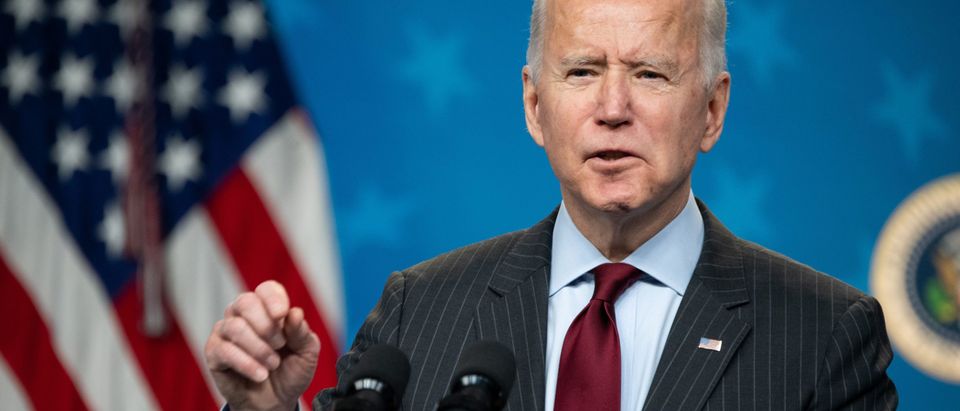Some congressional Democrats are reportedly having reservations about the expansive voting bill that President Joe Biden has made a top priority.
Biden has even considered upending Senate rules in order to pass the bill, called the For The People Act, over Republican objections, the New York Times reported.
Several states run by Republicans have pushed for election integrity bills that put in place rules such as voter ID laws and restrictions on absentee ballots.
Democrats have emphasized the importance of pushing back on Republicans’ election legislation, including Georgia Gov. Brian Kemp’s recently passed election integrity legislation. Democratic New York Sen. Chuck Schumer said that “failure is not an option.”
The For The People Act is over 800 pages and contains reforms such as changes to campaign finance laws, changes to redistricting rules, automatic voter registration, ending gerrymandering and giving felons the right to vote. The legislation passed in the House of Representatives in early March and now moves to the Senate.
But not all Democrats are on board with the expansive legislation, according to the report. Some argue that the For The People Act should be split into a narrower bill that strictly focuses on voting laws in order to prevent it from failing.

U.S. President Joe Biden speaks as he meets with Senators from both parties on the critical need to invest in modern and sustainable American infrastructure in the Oval Office of the White House on February 11, 2021 in Washington, DC. An infrastructure bill that creates jobs remains a top priority of the Biden administration. (Photo by Doug Mills-Pool/Getty Images)
“Democrats have a narrow opportunity,” University of California election law expert Richard L. Hasen told the NYT. “There is a window here that could close anytime. I worry the kind of fights necessary to keep even the Democratic coalition together could blow up the whole thing and lose the chance to get anything done.”
Despite objections, some Democrats have argued that now is the time for ambitious reforms and said that the bill should be passed as is. Biden now faces a hard decision about whether he can rally enough Congressional Democrats to stand behind the For The People Act, or if he will need to break it up. (RELATED: ‘What If The White House Hung In The Balance?’: Democrats Launch Plan To Change Elections In Their Favor Forever)
Due to unanimous Republican opposition, Democrats would need to have all 50 of their senators be in favor of the bill and exempt it from the filibuster, a change in Senate rules, NYT reported. Democratic West Virginia Sen. Joe Manchin and others have said that they will not change the rules around the filibuster.
Manchin has signaled his opposition to the For The People Act, saying that he was opposed to federal intervention in election law, which is typically left to the states.
“Pushing through legislation of this magnitude on a partisan basis may garner short-term benefits, but will inevitably only exacerbate the distrust that millions of Americans harbor against the U.S. government,” Manchin said according to the outlet.
Other Democrats besides Manchin are also opposed to the measure, although few Democrats are willing to admit it, two anonymous lawyers close to the White House and congressional Democrats reportedly told NYT. Democrats are unwilling to admit opposition to the bill due to possible political repercussions, an unwillingness to admit that the coalition backing the measure is not as strong as some may think or fear of backlash from liberal groups who have made the For The People Act their top priority, according to the sources.
Democratic Minnesota Sen. Amy Klobuchar declined to give a direct answer to NYT about whether she would be willing to break up the bill.
“Right now, my focus is to keep this bill together as one package and get it through the committee,” she said, according to NYT.
Additional opposition has come from black house members who fear that independent redistricting commissions could cost them seats, particularly in the South, according to the report. Democratic Mississippi Rep. Bennie Thompson, who sponsored the For The People Act, voted against the bill because of his concern that there were not adequate protections in place to preserve their districts, NYT reported.
Others have expressed concerns about overreach and contradictions within the legislation and say that the bill ignores the reality that the thousands of jurisdictions across the country are different and cannot be forced to follow the same rules. The legislation also mandates the use of voting machines that haven’t yet been manufactured.
One example of what some Democrats would consider overreach is that the bill mandates that ballots be counted even if they arrive up to 10 days after election day. However, voters would also have up to 10 days to correct mistakes on their ballots, meaning that erroneous ballots could delay an election for up to 20 days.


